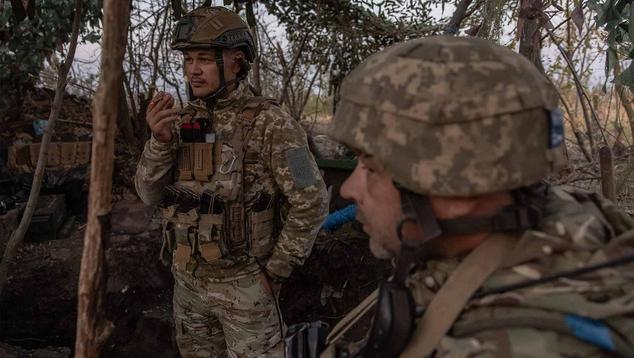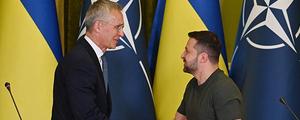Story Highlights
- Approval of Zelenskyy, confidence in military remain near record highs
- Approval of other key domestic institutions drops moderately as war drags on
- Satisfaction with healthcare, education shift in opposite direction from prewar levels
This article is the third in a series based on Gallup's surveys in Ukraine this past summer.
WASHINGTON, D.C. -- More than a year into the war with Russia, Ukrainians’ support of their president and the country’s military remains near the record highs set in the early months of the conflict. The rally effect for other institutions, however, may have been shorter-lived.
Over eight in 10 Ukrainians (81%) surveyed in July and August said they approved of the job that President Volodymyr Zelenskyy is doing. His approval is statistically undiminished from the record-high 84% measured a little over a year ago, as the country’s residents exhibited an unprecedented level of unity and faith in their institutions.
Since last year’s Gallup survey, conducted in September, Ukrainians have suffered many disruptions to their lives, from attacks on their energy infrastructure to regular power outages during the winter, high inflation and other financial hardships.
Despite the economic and psychological toll these are likely taking on people’s lives, Ukrainians continue to stand behind their president. This unwavering support holds strong across all demographic groups, geographic regions and income groups.
Similarly, the military continues to enjoy near-universal support among Ukrainians. Despite initial concerns among foreign observers that the recent military counteroffensive has proceeded slower than expected, Ukrainians do not seem to share these concerns and have, so far, preserved their faith in the ability of their military to get the job done.
Other National Institutions See a Moderate Drop in Support
While the executive and military branches continue to garner support from most Ukrainians, their support for other key national institutions has declined 18 months into the war. Confidence in the national government and the judiciary, as well as the perceived freedom of the media, all declined between seven and 13 percentage points from their record-high levels in 2022.
The decline since last year was the steepest for confidence in the national government (from 60% to 47%), perhaps precipitated by several high-profile corruption scandals involving public officials in 2023. Eight in 10 Ukrainians (80%) believe that corruption is widespread throughout the government, and even more (86%) believe that it is widespread within the country’s businesses.
However, more Ukrainians still express confidence in their government than at any point in the country’s prewar history since Gallup first started measuring confidence in 2006.
Similarly, the belief that their media has a lot of freedom dropped by 11 points from its peak in 2022 but remained higher than any prewar measurement in the previous decade. At the onset of the war, all major Ukrainian television news channels joined forces to create a single United News platform. While this move was broadly welcomed in support of national unity, some Ukrainians may have started to view the arrangement in a negative light.
Confidence in the judicial system fell somewhat less sharply, but still significantly. Ukrainians have, however, historically expressed little confidence in their judiciary. Trust in this institution did not surpass 30% even at the peak of Ukrainian unity in 2022. Approval levels for the judiciary (22%) are essentially back to prewar levels (19% in 2021).
Younger Men Least Likely to Express Confidence in Government
More men than women have lost confidence in the national government over the past year. The magnitude of the latter decline is the largest among younger men (15 to 34), while such a decline is not seen among men and women 55 and older.
Geographically, confidence in the national government in 2023 ranged from 42% in the South region to 53% in the East. Ukrainians in the East reported the smallest decline in confidence compared with last year.
About Half of Ukrainians Satisfied With Their Schools, the Availability of Healthcare
The war has also placed a severe strain on other vital domestic institutions, such as the healthcare system and the schools. Thousands of schools have been damaged or destroyed, and the learning process in the remaining schools has been disrupted by electricity blackouts and safety concerns.
A firm majority of Ukrainians remained satisfied with their schools during the peak years of the global COVID-19 pandemic, but after more than a year of war, fewer give their schools a passing grade.
Ukrainians’ satisfaction with the educational system or the schools in the city or area where they live has dropped to 49% in 2023 -- a 10-point decline from the prewar peak of 59% just two years ago.
Despite the traumatic consequences that the war has had on the overall physical and mental health of the population and the strain to the healthcare system, Ukrainians have not lost faith in their healthcare system and remain appreciative of its efforts to adapt to operating in times of war.
Satisfaction with the availability of quality healthcare is trending upward from the immediate prewar, pandemic years. In July 2023, 45% of Ukrainians reported satisfaction with the quality of healthcare available to them -- the highest on record since the trend began in 2006.
Bottom Line
A year ago, Gallup World Poll surveys found Ukrainians rallying together against the external threat to their nation. Domestic divisions faded into the background, and support for the country’s leaders, institutions and the war effort was widespread. A year later -- despite the ongoing war, attacks on infrastructure and economic challenges -- this unity remains strong, and unwavering majorities continue to trust the leadership of their president and the country’s military.
Not all domestic political institutions continue to experience this rally effect to the same degree, however. Renewed awareness of corruption problems and uncertainty about the future appear to be causing a moderate decline in the public’s confidence in other key domestic institutions, such as the national government, judiciary and educational system.
Perceived freedom of the media is also sliding closer to prewar levels. This suggests that -- with a protracted war probably on the horizon -- Ukrainians are growing more likely to view and assess domestic institutions on their individual merits rather than viewing them all solely through the prism of the war effort.
To stay up to date with the latest Gallup News insights and updates, follow us on X.
For complete methodology and specific survey dates, please review Gallup's Country Data Set details.
Learn more about how the Gallup World Poll works.




